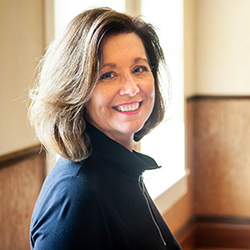

Sian Young
The Matthews Opera House and Arts Center
Tell us a bit about yourself, the organization you represent, and the work you do.
I have been the executive director of The Matthews Opera House and Arts Center since 2011. My previous work experience was in consumer products strategic planning and new product development. The Matthews is the local arts council and has been the cultural hub for our community of Spearfish for over 110 years. We champion participation in the arts from our historic opera house, an art gallery and community gathering space, an outdoor summer arts festival, and arts collaborations with local outreach partners. Our programming includes community theater, music performance series, children’s theater, visual arts programs, humanities series, film festivals, community arts projects, and residency programs with our schools and social service agencies.
Tell us about your community/the communities you serve, and your part of the country.
Nestled in the Black Hills of western South Dakota, Spearfish is a small college town of 11,000 with a regional hospital and health clinics, timber and ranching industries, and a significant retirement population. We are growing quickly by small town standards. Still, most would describe our location as pretty remote—we are almost 350 miles from the closest community of 100,000 people. Being outdoors is an important part of our culture: hiking, skiing, biking, fly fishing, and rock climbing are all easily accessible for our residents. We are located close to major national parks and landmarks such as Mount Rushmore, Devil’s Tower, Crazy Horse Monument, Bear Butte, and the Black Hills National Forest, so we welcome many visitors to our community throughout the year.
What did it mean to you and your community to host the U.S. Poet Laureate?
We were honored and delighted to host Tracy K. Smith in our community at our opera house! Our turnout was excellent—children with their parents, college students, young adults, and seniors all poured into our venue to be a part of this unique poetry experience. For many in our community, this was their first opportunity to participate in a reading and discussion with a nationally recognized poet. As an arts center, we were particularly pleased to be able to showcase poetry as an art form in such a visible and accessible way. Audience members were very engaged and the question-and-answer period was lively!
Can you share any feedback you received from event attendees/participants?
We received universally positive comments from everyone who spoke to us about the event. They really enjoyed the read-and-discuss format that was used for poems from Ms. Smith’s new anthology and were thrilled to receive a personal copy. Most wished that the event could have lasted longer! Our audience members expressed deep appreciation for the effort that was made by Poet Laureate Smith and the Library of Congress staff to visit a location that requires extra travel time.
What, if any, type of literary programming do you present in your community? How did this program fit in?
Our arts center presents a monthly humanities brown bag lunch series that features local writers and humanities speakers. Through our Reader’s Theater program, residential treatment facilities and assisted living facilities have live poetry, prose, and script readings brought into their lives. Every year we bring Shakespeare workshops and productions to our community with a national traveling troupe. We lead the NEA Big Read in our community every two years; we have extensive arts and humanities programming for Station Eleven authored by Emily St. John Mandel scheduled for January–March 2019. We collaborate regularly with Black Hills State University, Grace Balloch Library, and the Spearfish School District on many humanities programs. In fact, our great turnout for Poet Laureate Smith was due to these partners also being engaged in promoting the event throughout our community. “American Conversations” was a perfect addition to our humanities programming because it brought poetry to the center of the stage for our community.
